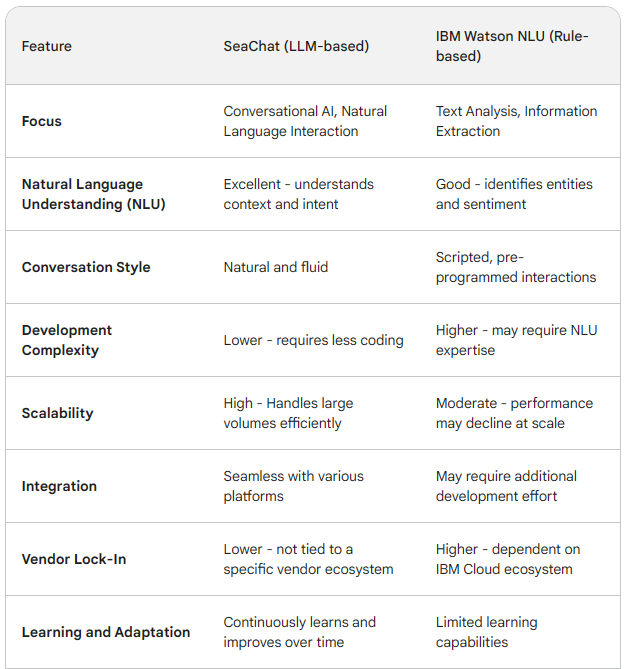Is your chatbot stuck on a deserted island of repetitive responses and unnatural dialogue? Are you yearning for a more engaging and human-like chat experience for your customers? Then it’s time to set sail for the future with SeaChat, a powerful platform built on Large Language Models (LLMs). While IBM Watson NLU has been a reliable tool for text analysis, SeaChat offers a revolutionary approach to Conversational AI, leaving traditional NLU engines in its wake.
IBM Watson NLU: A Solid Foundation, But Limited Horizons
IBM Watson NLU has long been a respected player in the realm of AI, excelling at extracting valuable information from text data. Its ability to identify entities, sentiments, and relationships within text empowers businesses to gain insights from customer inquiries and social media conversations.
The following is a summary of IBM Watson Natural Language Understanding (NLU) features and capabilities:
- Text Analysis: Uses deep learning to extract meaning and metadata from unstructured text data.
- Semantic Features: Analyzes text for categories, concepts, emotions, entities, keywords, sentiment, relations, and syntax.
- Language Support: Hosted in multiple locations and supports 13 languages depending on the feature.
- Deployment: Can be deployed behind a firewall or on any cloud.
- Customization: Trainable with Watson Knowledge Studio to understand the language of your business and extract customized insights.
- Real-Time Insights: Provides tools to pull metadata and patterns from large data troves.
- Entity Detection: Identifies people, places, events, and other types of entities mentioned in content.
- Categorization: Uses a five-level classification hierarchy for data categorization.
- Concepts Identification: Identifies high-level concepts not directly referenced in the content.
- Emotion and Sentiment Analysis: Extracts emotions and analyzes sentiment towards specific target phrases or the document as a whole.
- Relation Understanding: Understands the relationship between two entities within content.
- Metadata Extraction: Quickly extracts information like author, title, images, and publication dates from documents.
- Syntax Parsing: Parses sentences into subject-action-object form.
Here’s where Watson NLU shines:
- Deep Text Analysis: Extracts a wealth of data from text, including entities, keywords, concepts, and sentiment analysis.
- Customization:: Tailor the analysis to your specific industry and terminology for accurate results.
- Multilingual Support: Analyze text in multiple languages, opening doors to a global audience.
However, when it comes to crafting natural and engaging chat experiences, Watson NLU has limitations:
- Limited Conversational Skills: Designed for text analysis, it struggles to understand context and intent in a flowing conversation.
- Scripted Interactions: Conversations with chatbots powered by Watson NLU can feel rigid and pre-programmed.
- Development Complexity: Building complex chatbots requires significant coding expertise.
SeaChat: Charting a Course for the Future of Chat
SeaChat, powered by LLM technology, breaks the mold of traditional chat experiences by offering:
- Advanced Natural Language Understanding (NLU): LLMs excel at comprehending the nuances of human language, enabling SeaChat to have natural, context-driven conversations with users.
- Conversational Learning: SeaChat continuously learns and adapts based on user interactions, constantly improving its ability to handle complex queries.
- Seamless User Experience: By understanding context and intent, SeaChat fosters a more natural flow of conversation, mimicking human interaction.
Here’s why SeaChat is the future of chatbots:
- Natural Conversation: Users crave chatbots that feel like talking to a real person, which SeaChat delivers through LLM technology.
- Reduced Development Time: Building chatbots with SeaChat requires less coding compared to NLU engines, saving you time and resources.
- Scalability for Growth: SeaChat effortlessly handles large volumes of user interactions, ensuring smooth performance even during peak times.
Upgrade Your Chat Experience: SeaChat vs. IBM Watson NLU
Let’s delve deeper with a comparison table to see how SeaChat and Watson NLU stack up:

SeaChat vs IBM Watson-NLU
Study has shown the difference of intent/entity based NLU vs. LLM-based NLU is in the millions: in terms of training examples, it’s 630,000 examples versus a mere 32. This dramatic reduction in training data requirements translates to significant cost savings for businesses adopting GenAI/LLM-based NLU.
Setting Sail for a More Engaging Conversational Future
The future of Conversational AI lies in natural, engaging interactions. While Google Dialogflow has served its purpose, SeaChat offers a revolutionary approach powered by LLMs. Consider upgrading your chatbot to SeaChat for a more dynamic and human-like experience that will keep your users engaged and coming back for more. Let your chatbot ride the wave of the future with SeaChat!


 Subscribe
Subscribe